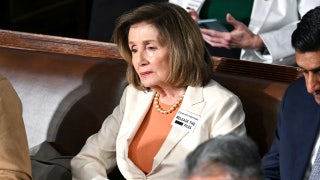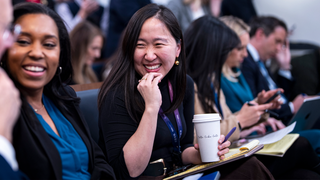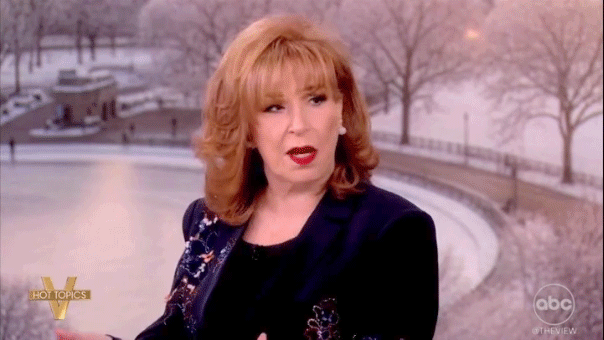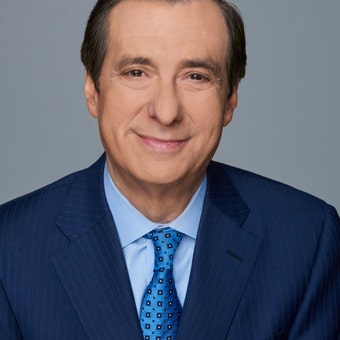Humanitarian disaster at border overshadows Biden's 'Help Is Here' tour: Howard Kurtz
Fox News media analyst Howard Kurtz provides insight on ‘America’s Newsroom.’
Last September, when the House passed a resolution condemning anti-Asian bigotry and discrimination, every Democrat voted for it—joined by just 14 Republicans.
Why did this symbolic vote become a partisan battle?
House Republican Whip Steve Scalise said lawmakers were "wasting their time with the measure," but the Democratic sponsor, Grace Meng, said "people’s lives are at stake."
The horrific shootings in Atlanta have plunged the country into an acute awareness, and difficult debate, over hatred aimed at this community. And, as with every mass killing or terror attack, political finger-pointing has immediately been woven into that very raw discussion.
Whether the murder of eight people, six of them Asian-American women, at three spas fits the strict legal definition of hate crime is a matter for law enforcement. President Biden is heading to Atlanta today to show his concern about what he called "brutality" against Asian-Americans. What’s beyond dispute is that many in the community are understandably frightened.
We spent much of last year grappling with racial injustice in the wake of George Floyd’s killing, as well as unacceptable violence in the riots that followed. The media spend enormous amounts of time and energy in chronicling bias and crime against certain communities: Violence against blacks. Violence against Jews. Violence against Muslims.
Unfortunately, Asian-Americans are way down on the radar screen.
Despite a long history of discrimination—from the Chinese Exclusion Act of 1882 to Japanese internment during World War II--they have been viewed in recent decades as a model minority. The image is that of people who work hard, don’t make trouble and whose children get stellar grades.
TALE OF TWO PRESIDENTS: BIDEN, NOT TRUMP, GRABS HEADLINES WITH ABC SITDOWN
They have also been stereotyped as quiet and subservient. They don’t tend to rise to the highest political jobs and have little visibility in the media. Vice President Kamala Harris, the daughter of an Indian immigrant mother, is an exception, and so is Andrew Yang.
Experts say there is no revolting symbol of bigotry, like the noose or the swastika, against people of Asian descent. So sometimes there are disputes over whether a robbery of an Asian-American small business, for instance, is a hate crime.
But when Amara Walker, a Korean-American reporter for CNN, was doing a live shot for Don Lemon, someone drove by and shouted "Virus!"
Which brings us to the renewed complaints about Donald Trump referring to the "China virus," as he did again this week, or the "Wuhan virus," or "Kung flu," as he has in the past. Liberals and Democrats have long complained that Trump was contributing to a climate of bias against Asian-Americans.
I hate how the Chinese regime originally covered up and mishandled the coronavirus, but I also believed Trump’s use of these terms was an unattractive attempt to score political points.
There is a huge difference between that and tying the former president in any way to the violence in Atlanta.
As with all such mass shootings, it comes down to a crazy person with a gun. And I say after every tragic case that it’s unfair to say politicians have blood on their hands because some nutjob had access to destructive weapons.
The Oklahoma City bombing wasn’t Rush Limbaugh’s fault, as Bill Clinton insinuated. The shooting of Gabby Giffords wasn’t Sarah Palin’s fault. The shooting of police officers wasn’t Barack Obama’s fault. The shooting of Steve Scalise at a Republican baseball practice wasn’t the fault of liberals who the gunman admired. And Atlanta isn’t Trump’s fault.
It’s fine to debate and criticize the rhetoric by a president or former president, but to go beyond that quickly descends into the fever swamps of partisanship.
SUBSCRIBE TO HOWIE'S MEDIA BUZZMETER PODCAST, A RIFF OF THE DAY'S HOTTEST STORIES
At a House hearing yesterday, Rep. Doris Matsui, who was born in a Japanese-American internment camp, said that last year, "as I heard, at the highest levels of government, people use racist slurs, like ‘China virus,’ to spread xenophobia and cast blame on innocent communities, it was all too familiar."
But Republican Rep. Chip Roy, after denouncing Beijing’s handling of the virus, said: "My concern about this hearing is it seems to want to venture into the policing of rhetoric."
This debate may or may not turn ugly, but it is long overdue.










































